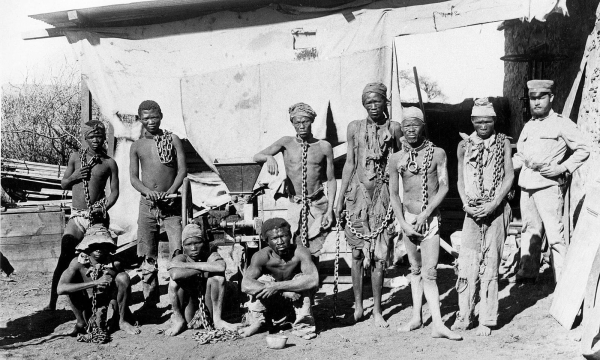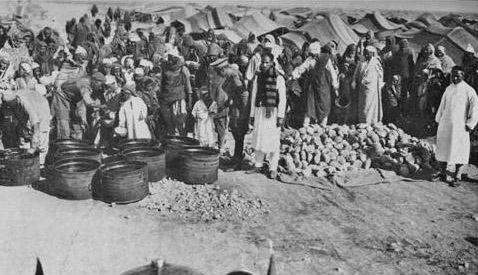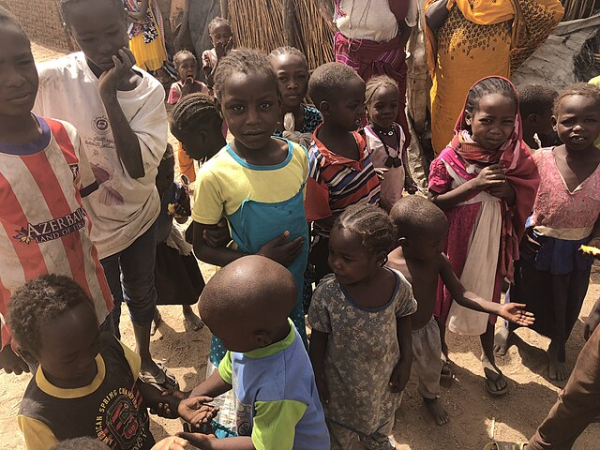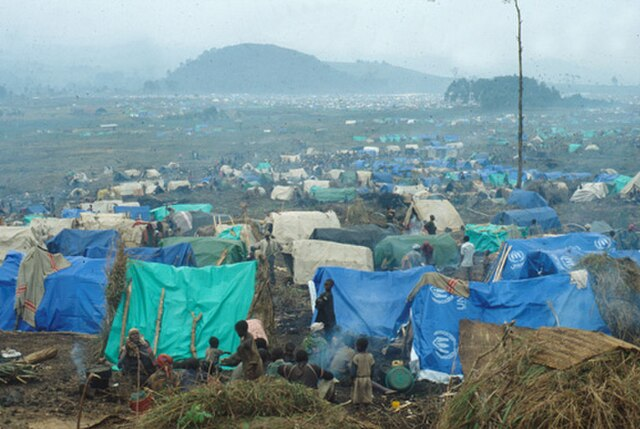Nearly 400,000 dead in Darfur. Around 62,000 Christians persecuted in Nigeria. More than 20,000 killed in Burkina Faso. At least 50,000 casualties in Burma’s civil war.
This is not just history. This is today, this was yesterday, this is ongoing.
The term “genocide” was coined by Raphaël Lemkin in 1944 to not only describe the ongoing Holocaust at the time but also to categorize previous atrocities in history. Since then, the word has been applied extensively in describing African conflicts. Between the 1904-1908 Herero and Nama genocide in German South West Africa, the current genocide in Darfur, South Sudan, and the many other atrocities in the middle of this timeline, all African civilians have lived through or witnessed a genocide — not to mention the millions that have been killed.
One of the main reasons for the substantial social and political turmoil in this massive continent is the cross-tribal relations that have existed for over 20,000 years. As centuries have passed, each of Africa’s 3,000 tribes has developed its own unique culture and social order. These differences have been a leading cause in African tribal warfare for centuries, often triggering disagreements that foster lasting tensions between groups.
Equally important in this situation is the colonization that occurred in Africa in the 19th and 20th centuries. During this period, over 90% of the continent was ruled by one of the main European powers at the time, including France, Britain, Germany, Portugal and more. Because of this, African nations could not establish a government separate from European influence. When colonial rule ended in the late 20th century, most independent African countries faced the challenge of establishing a new political organization that could satisfy their substantial populations.
However, the quest for unity was nothing short of difficult as disagreements between dozens of tribes made legal and social systems near impossible to establish. For the next few decades (and still today), practically the entire African continent would be plagued with conflict concerning which tribe would have the right to govern. Out of these issues came some of the worst atrocities known to humanity — many of which resulted in thousands or millions of deaths.
What’s worse is the lack of aid from the rest of the world that many of these nations experience. Though it is not new for Western nations to remain uninvolved in African conflict, this fact becomes all the more outrageous when the “African conflict” is a genocide.
Western involvement in Africa is truly a heated debate. The United States, for example, has participated in numerous conflicts since they first entered the continent during World War II, and later became more prominent there during the Cold War. Especially throughout the latter, the U.S. provided aid, technical packages, and even military assistance to some countries for their decolonization.
However, understandably, these decolonization processes were not always peaceful. In countries such as South Africa, Algeria, Angola, and Nigeria, the process of moving away from colonizers was notoriously a violent endeavor. Moreover, many countries spent numerous years battling internal struggles between different tribes who all wanted control.
Thus, in the following decades, tribal conflicts, coup d’etats, and other forms of violence swept over many countries as tribes set forth to take over the government. Colonial rule also continued to have effects on these countries and their paths to development.
The Herero and Namaqua Genocide – 1904-1908
The Herero and Namaqua Genocide happened before “genocide” was a real term. However, when the word came about, it was one of the first events to be reevaluated. It is now considered to be one of the first genocides to have ever occurred. Throughout this horrific and often forgotten genocide, approximately 50,000–65,000 Herero and 10,000 Nama were killed by German military forces in German South West Africa (now referred to as Namibia).
Prior to this event, this region, filled with multiple, peaceful cultural groups, was colonized in 1884 by the Germans. However, issues emerged when Germany claimed the land and began to force the indigenous population to work for them. Over time, the tensions between the native people, specifically those in the Herero and Nama groups, and the colonizers rose significantly until it culminated in an organized revolt by the Hereros led by Chief Samuel Maharero. Over 100 German settlers were killed during the altercation, which resulted in German forces retaliating.

Over the next few months, German troops under Major Theodor Leutwin and Lieutenant General Lothar von Troth successfully subdued the Herero population using their modern technology and skills. This violence came to a height when the actual Nama and Herero genocide began in 1904. Although the native peoples had been under constant abuse by German colonizers for 20 years, it was only at this point that Trotha abandoned negotiations for a surrender and attacked the Herero at the Battle of Waterberg, ultimately resulting in the death of 3,000 to 5,000 natives.
Over the course of the next four years, tens of thousands of more natives would be killed by the Germans, either by brutality or starvation and dehydration.
Although this genocide does not embody tribalist-nationalist conflict, it demonstrates the buildup to later events in our timeline — before the rest of the world would pay attention.
The Libyan Genocide – 1929-1934
Like the Herero and Nama genocide, the event in Libya occurred due to colonialism. In 1911, the Italian government (under Benito Mussolini) invaded and took control of Libya by annexing its capital, Tripoli. Similar to many colonizers at the time, the Italians were nothing short of brutal with the natives in the land and utilized them for labor. The fascist rule in Italy at the time also fostered a sense of nationalism that played a large role in motivating colonization.
Tensions soon took root between the Italian people and the Senussi (a Muslim political group led by Grand Senussi that formed in Libya and controlled much of North Africa). Unfortunately, these tensions resulted in multiple wars between the two groups.
In 1929, the Second Italo-Senussi War initiated the systemic killings of Libyans by Italian troops. For the next five years, more than 83,000 Libyan natives would be killed, including around 50% of the population of Cyrenaica, primarily through concentration camps. Throughout Italy’s rule in Libya, troops were responsible for hundreds of thousands of Libyan deaths. The genocide was largely driven by Mussolini’s racist and fascist colonial plan of to crush Senussi resistance led by Omar al-Mukhtar.
Besides being subjected to concentration camps, Libyans faced ethnic cleansing, mass killings, forced displacement, forced death marches, and chemical weaponry. The Bedouin tribe in particular suffered greatly, losing around half of its population between 1928 and 1932.
This genocide proves that genocides in Africa are not a new phenomenon. Even in a completely different region of the continent from the Herero and Nama genocide, violence has had devastating effects on native communities.

The Rwandan Genocide – 1994
In 1994, Rwanda experienced one of the worst genocides of the late 20th century. The Hutu and Tutsi tribes had coexisted for long, but tensions escalated due prejudiced beliefs and a hierarchy enforced by the Belgian government. When the Belgians arrived, they favored the Tutsis and marginalized the Hutus. Throughout their rule, they systematically chose to involve Tutsis, rather than Hutus, in government and other facets of work, which diminished the Hutus’ position in society to mostly agricultural occupations. When Belgium withdrew in the early 1960s, the Tutsis took control, which enraged the Hutu people.
In the 1990s, this hatred culminated in the Rwandan Genocide. After President Juvenal Habyarimana was overthrown, the new Rwandan interim government demonized the Tutsis and launched a planned genocide to ethnically cleanse Rwanda. Around 800,000 people were killed in only 100 days.
The genocided ended when the Rwandan Patriotic Front, a rebel group founded by Rwandan exiles and led by Paul Kagame, won a military victory against the interim government. Kagame assumed presidency, but despite Rwanda’s progress under Kagame’s leadership, the genocide left a legacy of intense trauma.
These horrific killings are now remembered as one of the many times where abominable actions were ignored by greater powers solely because they occurred in a less powerful country. Throughout the genocide, citizens sent many cries for help to neighboring African nations, but they all turned a blind eye to the situation. The United Nations failed to support one of its members when it truly needed it, and the authorities of the United States, France, and Belgium were all notified about the horrific killings that were occurring in Rwanda but did not deliver an adequate response. Due to these countries’ ignorance, Rwanda suffered tremendously and as a result still experiences intense trauma from the event today.
The Darfur Genocide – 2003-present
For over 20 years, Sudan has undergone a series of violent events. Beginning in 2003, the military-led government of Sudan, the National Congress Party (NCP), and their representative militia, Janjaweed, fought rebel groups in Darfur. From then until 2005, around 200,000 civilians died from violence, disease, and starvation, with another 2 million being forced out of their homes.
The Sudanese government specifically targeted people of the Fur, Masalit, and Zaghawa communities, ultimately amounting to an obvious ethnic cleansing of the population. Not only did these forces lead with violent attacks (including rape) against people of these tribes, but they also burned their homes, villages and crops, leaving these communities essentially powerless.
The worst part of this genocide was the surprising involvement of the government. The genocide in Darfur was calculated and intentional. For two years, the government openly supported Janjaweed troops in systematic attacks against civilians of specific ethnic groups, bombed civilians from the air, and murdered, raped, and persecuted their people based on race, ethnicity, and religion.
It was in 2004 that the US Secretary of State Colin Powell deemed the Sudanese government’s actions in Darfur a genocide, but this did little to stop the violence from continuing.
Though most genocidal actions came to a halt in 2005, attacks still occurred on a smaller scale. However, in just 2019, the genocide jumpstarted once more with an uprising against the government that ultimately resulted in the removal of the president at the time, Omar Hassan al-Bashir. The civilian government that came out of this event enacted multiple reforms to hand over more power to the population of Sudan. Despite the fact that a military-dominated government soon returned to power, the effects of the uprising were undeniable.
The instability of the government revealed in the spring of 2019 inspired other groups to lead their own coups. In October of 2021, the Sudan Armed Forces (SAF) and the Rapid Support Forces (RSF) took over the government and formed a Transitional Military Council (TMC). Despite their promises to shift the government to civilian rule, the TMC actually reversed many of the reforms enacted by the civilian government in 2019.
These actions inspired more protests to occur while the RSF and SAF was in power, primarily trying to urge the government to shift back to a civilian administration, which involved the RSF and SAF merging together. However, the RSF rejected this idea, bringing more conflict to the scene.
In April of 2023, the RSF officially turned against the SAF when they attacked their positions in Khartoum and some of their military sites. In the midst of this violence between the two groups, civilians became not only common collateral damage, but occasional targets, reintroducing the risk of genocide in Sudan.
Today, the acts in Darfur are ongoing, with a current death count amounting to around 400,000 thousand and counting. Although the UN helped to develop the United Nations Integrated Transition Assistance Mission in Sudan (UNITAMS) in 2020 to help the people in Darfur, the conflict has yet to receive any more attention.

The Genocide in Nigeria – 2009-present
Nigeria is currently undergoing one of the deadliest genocides in the world. For the past 15 years, terrorist groups in the country have been leading violent attacks against Christians that have resulted in the deaths of over 350,000 people (mostly children) and the displacement of another 3 million.
These actions have primarily been led by Boko Haram, an Islamist jihadist organization, who have been responsible for numerous human rights violations not only in Nigeria, but in various countries in North-Eastern Africa. Specifically since 2022, jihadists have led numerous attacks on Christian civilians and have openly funded such activities led by the Fulani people in the Middle East and North-West Africa.
Perhaps the true downfall of these communities will be the sheer ignorance from the outside world. The United States, for instance, was in full denial about the genocidal nature of the Fulani massacres in 2022, claiming that the Fulani terrorism was caused not by genocidal intent but rather by the effects of “climate change” on such communities and their land. The Ambassador to Nigeria and State Department also deny the religious motivations for these attacks.
Nigeria’s own forces and police have also done more harm than good for the population. Their attempts to shut down the jihadist killings and defeat Boko Haram have ultimately led to deaths of hundreds of civilians, thus inspiring more citizens to support the terrorists.
The president at this time, Muhammadu Buhari, was ethnically Fulani himself and was of the Fulani Cattlemen’s Association. Due to this, he intentionally turned a blind eye to the Fulani massacres, providing the terrorists with the freedom to continue their efforts.
Since then, Buhari has been replaced with Bola Ahmed Tinubu, but things are still not looking up for Nigeria. Although Tinubu has not shown to directly support the genocidal events occurring in his country, he has not made any substantial efforts to end them. Combined with the ignorance of greater powers such as the United States, it is no surprise that the state of things in Nigeria today are nothing short of horrific. Since 2000, an estimated 62,000 Christian Nigerians have been murdered by Boko Haram, Fulani forces, or the Islamic State West Africa Province (ISWAP).
The genocide in Nigeria goes to show that violence is ongoing in Africa and has seemingly no end. The determination of terrorist groups in this country plus the rest of the world turning a blind eye will continue to cause thousands upon thousands of deaths and harm.
For over 100 years, the world has known of numerous genocides in Africa that have inflicted immeasurable harm on various countries and communities, and yet, has chosen to do little to help. When such enormous powers like the U.S. choose to push these atrocities under the rug, it leaves the countries in need defenseless.
Moving forward, it is important to be mindful of the events going on around us and take the time to analyze not only what is happening, but why it is happening. There is history behind these events and there is blame to be distributed. To take time to understand the context of current events means to take the time to educate yourself and give yourself the opportunity to fight for what’s right.
It has never been acceptable to let countries suffer on their own, regardless of which continent they belong to or how “developed” they may be.
Yesterday, today, and tomorrow, genocides continue in Africa. Today, you can do something about it. Advocate, educate, and push for global intervention to end these horrific events.
Between the 1904-1908 Herero and Nama genocide in German South West Africa, the current genocide in Darfur, South Sudan, and the many other atrocities in the middle of this timeline, all African civilians have lived through or witnessed a genocide — not to mention the millions that have been killed.

